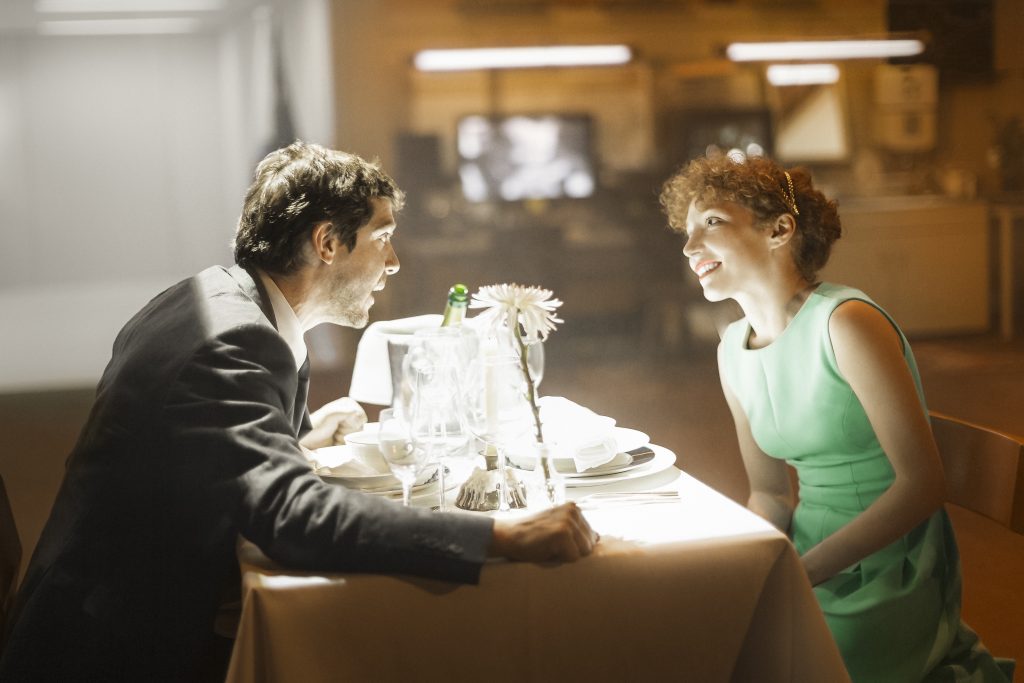Macht en leiderschap, kan het een zonder het ander bestaan? Toneelgroep Amsterdam presenteerde zondag 14 juni op het Holland Festival met ‘Kings of War’ een staalkaart van drie typen leiders. Drie historische stukken van Shakespeare over de strijd om de macht tussen de Huizen Lancaster en York vormden samen de brandstof voor deze voorstelling.
Met grote zwarte letters op een wit scherm, als een filmsequel, wordt keer op keer de nieuwe koning aangekondigd. Hun namen: Henry V, Henry VI, Edward IV, Richard III en Henry VII. Britse geschiedenis in de vorm van erfopvolging en moord tijdens de 14de en 15de eeuw. Dit alles opgeschreven en tot fictie gemaakt door ’s werelds beroemdste toneelschrijver William Shakespeare (1564 – 1616).
Shakespeare is dead, get over it.
Hier wringt gelijk de schoen, en niet zo’n beetje ook. Want hoe poëtisch en hoe tijdloos William Shakespeare in zijn algemeenheid ook mag zijn, het blijft wonderlijk om De wereld en De mens vijf eeuwen later nog altijd te duiden met een 16de eeuwse bril op. De Vlaamse toneelschrijver Paul Pourveur schreef begin deze eeuw dan ook niet voor niets het stuk ‘Shakespeare is dead, get over it’ als reactie op de marathonvoorstelling ‘Ten Oorlog’, gebaseerd op acht Shakespearestukken, van de Blauwe Maandag Compagnie. De puberliefde van Romeo en Julia en de jaloezie van Othello lenen zich meer voor de eeuwigheid dan krochten van de zielen van deze koningen. De tekst van ‘Kings of War’ an sich, vaardig en sober vertaald (Rob Klinkenberg), verschaft weinig houvast en inzicht als het gaat om alle Henry’s, Edwards en hun vazallen.
Want, face it, onze democratisch gekozen leiders in het Westen beschikken niet (zo makkelijk) meer over leven en dood van hun bevolking. En onze eigen koning, subject van erfopvolging, is een tandeloze tijger als het gaat om concrete macht. Alleen in een gesloten dictatuur als Noord-Korea heb je nog een leider met stamboom die velen de dood injaagt als het hem belieft. De teksten van Shakespeare zijn geen hulpmiddel in dit leiderschapsonderzoek. Het is het weergaloze duo Van Hove/Versweyveld dat met regie en vorm urgentie en context aanbrengt rond de mechanismes van de macht in deze eeuw en dit werelddeel.
Het decor lijkt een warroom in een jaren-zeventigbunker, waarvan de inrichting zich per koning aanpast aan diens leiderschapsstijl.
Bij de goede en wijze Henry V (Ramsey Nasr) zijn er landkaarten en tafeltjes. Rechts een nis voor vier blazers en later een DJ. Een bariton die prachtige renaissanceliederen zingt dwaalt geregeld over de vloer.

Bij de beïnvloedbare en vrome koning Henry VI (Eelco Smits) is er een grote vergadertafel in het midden met veel bijbels en plek voor konkelende partijen. Tot slot eindigt de wraakzuchtige en machtsgeile Richard III (Hans Kesting) in een gesloten kale ruimte met niets meer dan een stoel en zijn eigen spookachtige gedachten.
Show, don’t tell
Achter de warroom is een klinisch wit gangenstelsel waar wordt gekonkeld, gevochten en gestorven, al dan niet op ziekenhuisbedden. Zwaarden zijn spuiten geworden. Het vernuft van associaties met onze tijd zit zeker ook in deze details.
De troon is een houten stoel, een bank of leren fauteuil: het doet er niet toe. Als de koning zit, zit de koning. Wat wel steeds hetzelfde is en plechtig wordt overgedragen is de Kroon. Iedere kroning wordt plechtig en van boven gefilmd en achter op het toneel op een groot scherm getoond, net zoals de camerabeelden uit de witte ondergrondse gangen.
Een van de meest ontroerende scenes uit de voorstelling komt met behulp van deze geslaagde combinatie van live toneel en film tot stand. Op het voortoneel kussen een onhandige Edward V en zijn bruid Katharina van Valois elkaar. Binnen tien seconden zien we zowel het verloop als het einde van hun huwelijk dankzij een prachtige combinatie van theater- en filmtechniek.

Opvallend is het hechte en hoogwaardige ensemblespel in de eerste twee delen waarin geen enkele dissonant klinkt. Wel is een eervolle vermelding op zijn plek voor hoe sensitief en subtiel Aus Greidanus oom Gloucester, regent van koning Henry VI, vormgeeft. Het slotakkoord draait om de kwade Richard III en om Richard III alleen. Het is Hans Kesting, die ondanks zijn verminkte voorkomen ons het kwaad toont als een vriendelijke en voorkomende figuur, die na een serie gruwelijke moorden de relativerende woorden “een mens gaat weleens ondoordacht te werk” spreekt.
Game of Crownes
Wat maakt nou dat deze vijf uur durende ‘Kings of War’ geen lange zit is, maar een intrigerende trip die wel degelijk relevant is als het gaat over macht en leiders?
Dat is het rijke scala van associaties aan series die in ons collectief bewustzijn rondspoken. We bespreken ze wekelijks bij de koffieautomaat en het internet staat vol met blogs als de grenzen aan wat wij, de kijkers, proportioneel geweld vinden, worden overschreden. Zo heeft de megapopulaire fantasy HBO serie ‘Game of Thrones’ veel gelijkenis met de periode van de vorsten uit ‘Kings of War’. En Netflix heeft haar eigen hedendaagse Richard III in de vorm van Francis Underwood in de de serie ‘House of Cards’.
Genoemde series en andere vormen een ijkpunt als het gaat om moraliteit. Een functie die films en boeken ook hebben, of liever gezegd hadden. We oefenen ons denken over leiderschap en aanschouwen het gebruik van macht. Wat zouden wij doen als president van de VS? Wat zouden wij doen als we een weerloze jonge bruid tot onze beschikking hebben? Kijken naar deze voorstelling is als het kijken naar hedendaagse series, een oefening van onze gewetensspier.
